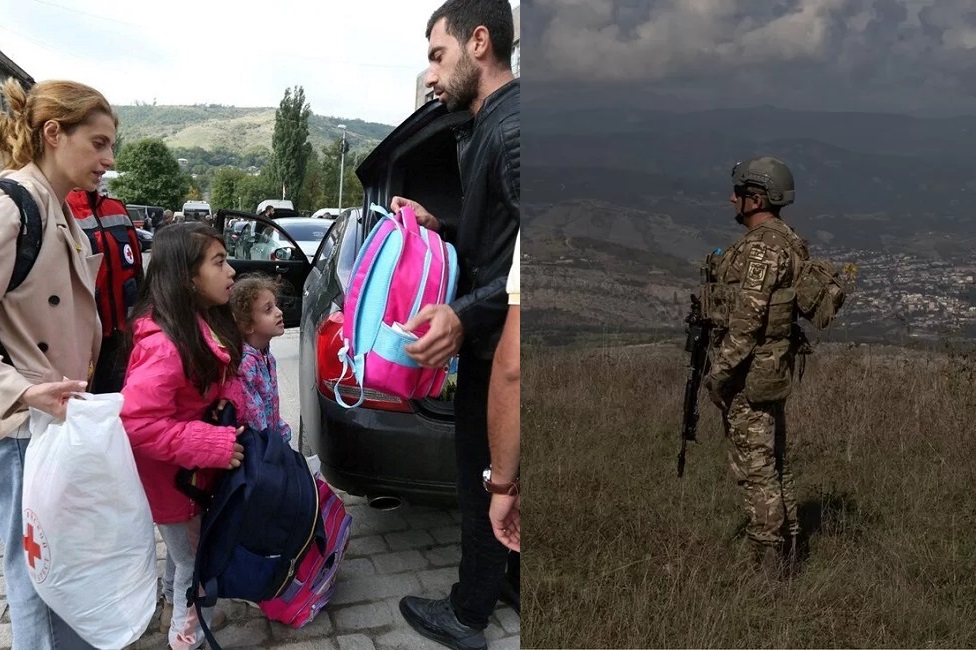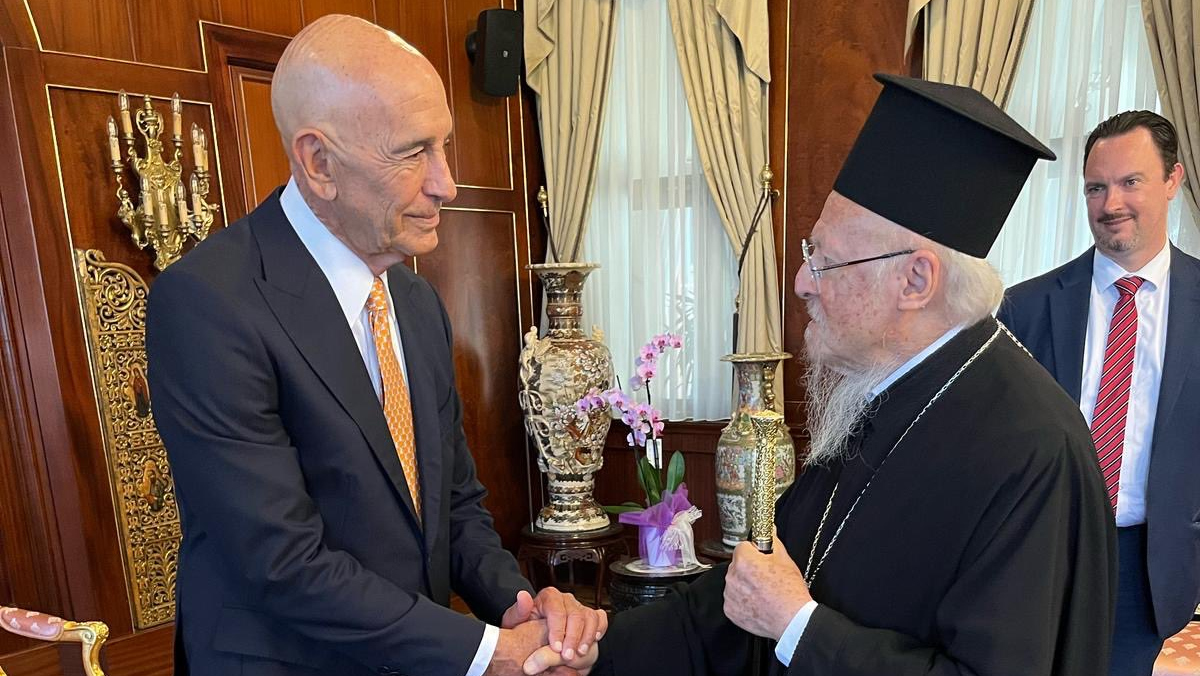
Accounts on the events of 1915 are frequently subject to distortions and errors. In order to dispel these distortions and errors, one must be very careful when choosing words or phrases to describe a specific event or fact.
When giving an account of the events of 1915, the Ottoman government’s decision to move its Armenian subjects away from their residence to other places during World War I is referred to in a number of ways. Examples of this include “relocation”, “exile”, “forced migration”, and “displacement”. Alongside these, one frequently used word is “deportation”. This is, however, an incorrect use of this word, because the meaning of this word does not overlap with the Ottoman government’s decision. In the dispute over whether or not the events of 1915 constituted genocide, individuals situated on both sides of the dispute employ the incorrect use of the word “deportation”. This incorrect use can be attributed to a lack of knowledge about the issue, and more so to inattention or negligence.
It became necessary to write this commentary when the “deportation” word was yet again used incorrectly during the hearing of the Perinçek v. Switzerland case in the Grand Chamber of the European Court of Human Rights (ECHR) on 28 January 2015. Doğu Perinçek’s public rejection to categorize the events of 1915 as genocide during his visit to Switzerland, and whether such a public rejection can be punished or not lays at the heart of this very important case.
When referring to the Ottoman government’s decision to move its Armenian subjects, the applicant Doğu Perinçek (speaking in Turkish) used the phrase “zorla göç”, which was translated by the simultaneous interpreter as “deportation.” Mr. Perinçek’s counsel Mehmet Cengiz (speaking in Turkish) used the word “sürgün”, which was again translated as “deportation”. Perinçek’s other counsel Christian Laurent Pech (speaking in French) used the word “déportation”, which was translated into English as “deportation”. Finally, the counsel for Turkey (a third party to the case), Stefan Talmon (speaking in English) used the word “deportation”.[i] All these cases of the use of the word “deportation” are problematic.
The primary meaning of the word “deportation” in the English language is: “an act or instance of deporting”[ii], the word “deporting” itself meaning “to force (a person who is not a citizen) to leave a country”.[iii] To put it another way, “deportation” means “the removal from a country of an alien whose presence is unlawful or prejudicial”.[iv] As such, “deportation” has no place when describing the Ottoman government’s decision. The Armenian people were subjects of the Ottoman Empire, they were not considered to be aliens. Furthermore, during the war, they were moved within the borders of the Empire, they were not expelled out of the borders.
Mr. Perinçek used the Turkish phrase “zorla göç”, which can be translated as “forced migration”. This is not the same as “deportation”. “Migration” does not necessarily entail moving out of a country,[v] “deportation” does.
Mr. Cengiz used the Turkish word “sürgün”, which can be translated as “banishment” or “exile”.[vi] These too, are not the same as “deportation”. “Banishment” or “exile” do not necessarily entail being forced to move out of a country, “deportation” does.
Mr. Pech’s used the French word “déportation”, which one would assume to be the same as the English word “deportation”. However, these two words do not mean the same thing. The French word “déportation” can either mean “being sent away (as a convict) to a faraway place (specifically to one of the past or present overseas territories of France)”, or “being sent to a concentration camp in another country (during World War II)”.[vii] The French word “déportation” itself poses a complication, since it has very specific historical meanings that cannot be related to the Ottoman government’s decision.
The incorrect use of the English word “deportation” has already been elaborated above, so there is no need to further explain why Mr. Talmon’s use of this word is problematic.
Translation between any two languages is difficult, because each language has its own nuances that may not easily be conveyed in another language. Simultaneous interpretation is even more difficult, as the interpreter is forced continuously translate without a chance to pause and thoroughly evaluate the meaning of words and phrases.
Moving beyond the difficulties of translation, however, it should be reiterated that the English word “deportation” (and also the French word “déportation”) should be avoided in the context of the Ottoman government’s decision. The use of such words leads to misunderstandings about the events of 1915. “Relocation” or “resettlement” are more appropriate words to use in this context. “Relocation” simply means moving or being moved to a different place,[viii] while “resettlement” means “the act or instance of settling or being settled in another place”[ix], and as such both words leave no room for misunderstandings.
[i] The speeches delivered by the mentioned individuals can be accessed on ECHR’s website: http://www.echr.coe.int/Pages/home.aspx?p=hearings&w=2751008_28012015&language=en
[ii] “Deportation”, Merriam-Webster.com, http://www.merriam-webster.com/dictionary/deportation
[iii] “Deport”, Merriam-Webster.com, http://www.merriam-webster.com/dictionary/deporting
[iv] “Deportation”, Merriam-Webster.com.
[v] “Migrate”, Merriam-Webster.com, http://www.merriam-webster.com/dictionary/migration
[vi] Unlike its English translations, the word “sürgün” in Turkish carries no connotations about leaving one’s country. “Banishment” and “exile” do have such connotations, but not entirely. “Sürgün”, Türk Dil Kurumu – Büyük Türkçe Sözlük, http://www.tdk.gov.tr/index.php?option=com_bts&view=bts; “Banish”, Merriam-Webster, http://www.merriam-webster.com/dictionary/banishment; “Exile”, Merriam-Webster, http://www.merriam-webster.com/dictionary/exile.
[vii] “Déportation”, Le-Dictionnaire.com, http://www.le-dictionnaire.com/definition.php?mot=d%E9portation
[viii] “Relocate”, CollinsDictionary.com, http://www.collinsdictionary.com/dictionary/american/relocation
[ix] “Resettlement”, CollinsDictionary.com, http://www.collinsdictionary.com/dictionary/english/resettlement
© 2009-2025 Center for Eurasian Studies (AVİM) All Rights Reserved
No comments yet.
-
 SOME CRITICISMS REGARDING PROF. DR. ERIK-JAN ZÜRCHER’S CENTENNIAL STATEMENT - II
SOME CRITICISMS REGARDING PROF. DR. ERIK-JAN ZÜRCHER’S CENTENNIAL STATEMENT - II
Mehmet Oğuzhan TULUN 14.06.2015 -
 MEDDLING IN TURKISH-ARMENIAN RELATIONS: PROPOSED AMENDMENTS ON THE EUROPEAN PARLIAMENT RESOLUTION ON 2014 COMMISSION PROGRESS REPORT ON TURKEY
MEDDLING IN TURKISH-ARMENIAN RELATIONS: PROPOSED AMENDMENTS ON THE EUROPEAN PARLIAMENT RESOLUTION ON 2014 COMMISSION PROGRESS REPORT ON TURKEY
Mehmet Oğuzhan TULUN 03.05.2015 -
 THE RISE OF CHRISTIAN NATIONALISM
THE RISE OF CHRISTIAN NATIONALISM
Mehmet Oğuzhan TULUN 02.11.2022 -
 THE BATTLE TO CONTROL THE NARRATIVE OVER KARABAKH: ARMENIAN CIVILIAN SAFETY VS. AZERBAIJANI STATE SOVEREIGNTY
THE BATTLE TO CONTROL THE NARRATIVE OVER KARABAKH: ARMENIAN CIVILIAN SAFETY VS. AZERBAIJANI STATE SOVEREIGNTY
Mehmet Oğuzhan TULUN 06.10.2023 -
 THE HARMFUL EFFECTS OF THE POLITICIZATION OF THE FENER GREEK PATRIARCHATE
THE HARMFUL EFFECTS OF THE POLITICIZATION OF THE FENER GREEK PATRIARCHATE
Mehmet Oğuzhan TULUN 03.09.2025
-
 ARMENIAN TERRORISM BEGINS TO SHOW ITS FACE AGAIN
ARMENIAN TERRORISM BEGINS TO SHOW ITS FACE AGAIN
Hazel ÇAĞAN ELBİR 04.02.2021 -
 BECOMING THE PART OF THE PROBLEM: THE FAULTY POLICIES OF THE WEST IN EURASIA AND THE SOUTH CAUCASUS
BECOMING THE PART OF THE PROBLEM: THE FAULTY POLICIES OF THE WEST IN EURASIA AND THE SOUTH CAUCASUS
Turgut Kerem TUNCEL 11.08.2015 -
IGNORED DANGER: MEDZAMOR NUCLEAR POWER PLANT
Tutku DİLAVER 19.12.2018 -
 RELATIONS OF US SENATORS WITH FOREIGN LOBBIES: THE CASE OF MENENDEZ
RELATIONS OF US SENATORS WITH FOREIGN LOBBIES: THE CASE OF MENENDEZ
Teoman Ertuğrul TULUN - Tuğçe TECİMER 17.09.2024 -
 AFTER BREXIT: THE FOOTSTEPS OF A TRULY CAROLINGIAN EUROPEAN UNION
AFTER BREXIT: THE FOOTSTEPS OF A TRULY CAROLINGIAN EUROPEAN UNION
Teoman Ertuğrul TULUN 15.03.2019
-
25.01.2016
THE ARMENIAN QUESTION - BASIC KNOWLEDGE AND DOCUMENTATION -
12.06.2024
THE TRUTH WILL OUT -
27.03.2023
RADİKAL ERMENİ UNSURLARCA GERÇEKLEŞTİRİLEN MEZALİMLER VE VANDALİZM -
17.03.2023
PATRIOTISM PERVERTED -
23.02.2023
MEN ARE LIKE THAT -
03.02.2023
BAKÜ-TİFLİS-CEYHAN BORU HATTININ YAŞANAN TARİHİ -
16.12.2022
INTERNATIONAL SCHOLARS ON THE EVENTS OF 1915 -
07.12.2022
FAKE PHOTOS AND THE ARMENIAN PROPAGANDA -
07.12.2022
ERMENİ PROPAGANDASI VE SAHTE RESİMLER -
01.01.2022
A Letter From Japan - Strategically Mum: The Silence of the Armenians -
01.01.2022
Japonya'dan Bir Mektup - Stratejik Suskunluk: Ermenilerin Sessizliği -
03.06.2020
Anastas Mikoyan: Confessions of an Armenian Bolshevik -
08.04.2020
Sovyet Sonrası Ukrayna’da Devlet, Toplum ve Siyaset - Değişen Dinamikler, Dönüşen Kimlikler -
12.06.2018
Ermeni Sorunuyla İlgili İngiliz Belgeleri (1912-1923) - British Documents on Armenian Question (1912-1923) -
02.12.2016
Turkish-Russian Academics: A Historical Study on the Caucasus -
01.07.2016
Gürcistan'daki Müslüman Topluluklar: Azınlık Hakları, Kimlik, Siyaset -
10.03.2016
Armenian Diaspora: Diaspora, State and the Imagination of the Republic of Armenia -
24.01.2016
ERMENİ SORUNU - TEMEL BİLGİ VE BELGELER (2. BASKI)
-
AVİM Conference Hall 24.01.2023
CONFERENCE TITLED “HUNGARY’S PERSPECTIVES ON THE TURKIC WORLD"









